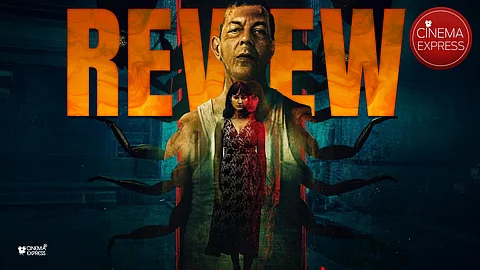Khauf Series Review: An inventive horror-drama which loses steam in the finale
Khauf Series Review(3 / 5)
A tall, lean middle-aged man lives in a bruised, shabby haveli with a blue wooden door in the narrow lanes of old Delhi. Played with a pensive heaviness by Rajat Kapoor, he doesn’t have a name but is called doctor or haakim by his patients, who come to resolve issues beyond their bodily control. “Jo nazron me na dikhe par ragon me mehsoos ho, uski pehchaan kisse karaye (That which cannot be seen by eyes but is sensed in every vein—who is to treat it?),” he asks another character at one point. The shaman-like doctor and his mysterious ‘Roohani Dawakhana’ are quintessential horror tropes which create a sense of dread in creator and writer Smita Singh’s Khauf. The show develops its spaces as people—alive, breathing and blinking. The camera manoeuvres through rooms like an eye trying to find what unseen floats in it; cracked walls, a paper-covered mirror and a huge black box hold a sinister story. Fear is not as much in seeing a grotesque figure upfront but in the eerie, silent anticipation of its arrival.
Kauf takes time to settle in. It doesn’t begin with a murderous thud but rather slowly spreads a sense of chilling mystery. The opening of the first episode makes it clear that it is not just a supernatural horror show. The fear of the unknown blends with the nerve-wracking terror which women experience while walking on the streets in Delhi. Even the city becomes a centrepiece for the horror that unfolds; the lecherous eyes of men catching every move, passing lewd remarks on a whim and forcing a touch in a crowded bus. The series primarily follows Madhu (Monika Panwar), who wants to start a new life in the metropolis after being sexually assaulted in her hometown, Gwalior. She leaves her city but carries the trauma along. What’s worse, she decides to stay in an old, dilapidated room of a secluded government girls’ hostel. It is the same room where something horrifying happened some months ago, which makes it impossible for other girls living in the nearby rooms to get out of the place.
Cast: Monika Panwar, Abhishek Chauhan, Geetanjali Kulkarni, and Shilpa Shukla
Creator and writer: Smita Singh
Director: Pankaj Kumar and Surya Balakrishnan
Streamer: Prime Video
There’s also a woman police constable Ilu Mishra (Geetanjali Kulkarni), who is looking for her missing son, Jeeva. She is friends with the hostel warden Gracie (Shalini Vatsa), with whom she gets drunk on nights. Smita builds a world of compelling characters with distinguished traits, and they feel as if they have come out of a dense novel. The screenplay tries to blend Madhu’s immense psychological trauma with the supernatural events that take place in the room. There is little dependence on jump scares and loud music to invoke tension. The horror is created with an interplay of meticulous sound design and vivid cinematography. There is a constant feeling of ‘something bad’ that is going to happen. It is subtly teased with visuals of darkly lit rooms and signs of life in the floating window curtains. Or the strikingly bizarre sounds of rather mundane things like pulling the cover from a car, tearing away newspaper pages or some veggies frying in a hot pan. Co-director and cinematographer Pankaj Kumar, known for shooting the exquisite Tumbbad (2018), carries restraint in his frames. His images speak for themselves, be it the murky glass bottles containing strange creatures in the haakim’s mansion or the grey-scaled floors of the girls’ hostel. Along with that, the lack of obvious cliffhangers at the end of its episodes works in favour of the show.
That being said, it falters in its final portions. There are newer things being revealed right till the sixth episode, but the lack of a satisfying resolution crumbles the castle that was tightly built before. After this, there is little left even in the performances which hit. Monika is clearly the powerhouse here, embodying the vulnerability and fear with equal conviction. At times, it is the frail lifelessness visible on her face which creates a sense of discomfort. Geetanjali puts on a convincing show as a desperate mother wanting to know what happened to her son. Complementing her is Shalini, the pragmatic, cranky warden. All of them meet a rather simplistic resolve. The nuance and depth with which it began lose to forgettable and loose moments. These are also portions where it resorts to easy jump scares, while avoiding it earlier for the most part.
For all its carefully sown mystery, the last stretch slips into the ordinary. In horror stories, it is the final reveal which ultimately takes the suspense to the next level. What was haunting the room, why and how was it defeated? In Khauf, there is an ambition to do better, the dread is real, the atmosphere thick—but just when it should have all come together, it fades into fog. What begins with a promise of chills ends with barely a shiver.

